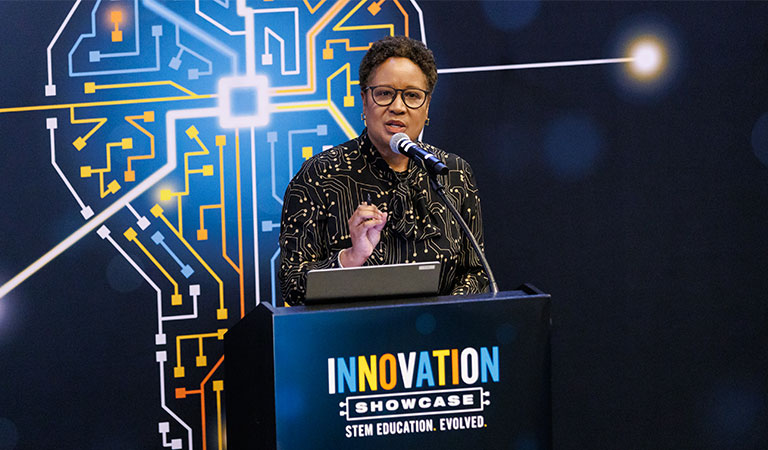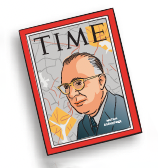Timeline of Harvey Mudd College
The founders of Harvey Mudd College believed that integrating the humanities, social sciences and the arts into a rigorous and cross-disciplinary undergraduate STEM curriculum was key to creating the next generation of well-rounded leaders and compassionate problem solvers. Their idea was an innovative concept in undergraduate STEM education. It would center the importance of strong undergraduate teaching with hands-on learning to build students’ capability to innovate and solve problems. The curriculum would explore the linkages and tensions between science and engineering on the one hand and the human condition on the other.
Throughout the years, the Harvey Mudd community has maintained an unwavering focus on students and the College’s mission. They’ve reached across disciplines and across departments to collaborate and develop unique solutions to help prepare students to lead and address the greatest challenges facing our world.
No timeline items match the filter(s) you have selected; please uncheck one or more to refine the selection.
1955
Early discussions
After the death of Harvey S. Mudd (1888–1955), Claremont College Board of Fellows’ Committee on Future Colleges recommends a new college be established, “one that teaches engineering and science in a humanistic setting.” Mildred Mudd donates $250,000 for the College; another $500,000 comes from Claremont College endowment funds.
1955
Harvey Mudd is official
Harvey Mudd College becomes a legal entity on December 14, 1955, making it the fifth of what will eventually become the seven-institution complex of The Claremont Colleges.
1956
HMC’s first president
Physicist Joseph B. Platt accepts the offer to become president of Harvey Mudd College.
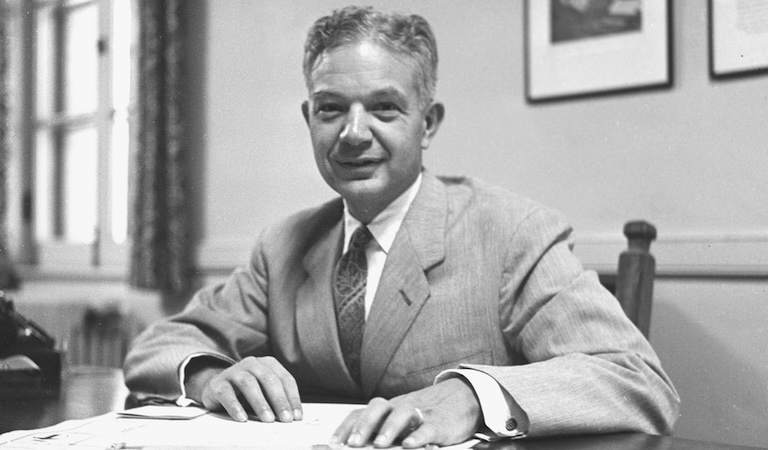
1956
Master planning
HMC owns 18 acres of land; campus master plan established by architects Edward Durell Stone and Earl Heitschmidt.
1957
Seven to start
Four professors and three assistant professors make up the faculty: William Davenport, professor of humanities; J. Arthur Campbell, professor of chemistry; Robert James, professor of mathematics; Duane Roller, professor of physics; George Wickes, assistant professor of humanities; Roy A. Whiteker, assistant professor of chemistry; and Graydon Bell, assistant professor of physics.
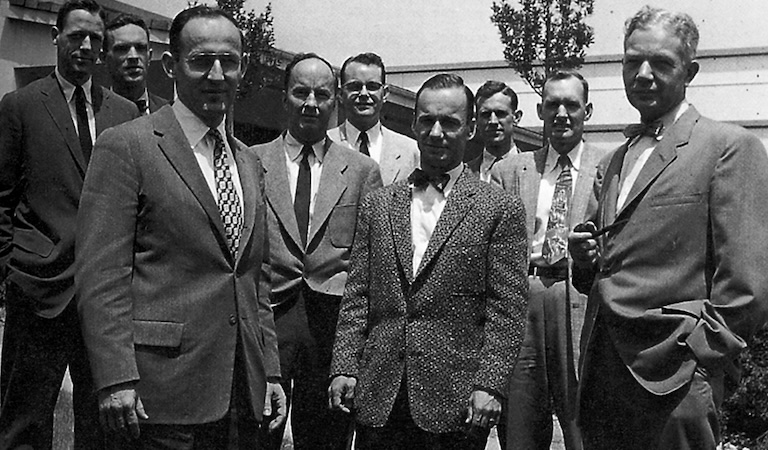
1957
Vote for co-ed
HMC board of trustees votes to admit women.
1957
College opens
The College officially opens in September 1957 with seven faculty members, 48 students (one woman, Jenny Rhine), three administrators (including President Joe Platt) and one dormitory (Mildred E. Mudd Hall/East)—the only building on campus. Tuition is $800.
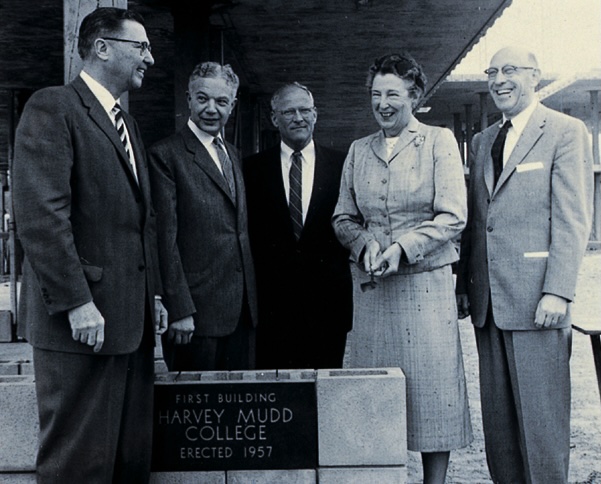
1958
Henry T. Mudd, Chair
Henry T. Mudd becomes chair of the board after the death of his mother, Mildred Mudd. Henry serves as chair for 23 years.
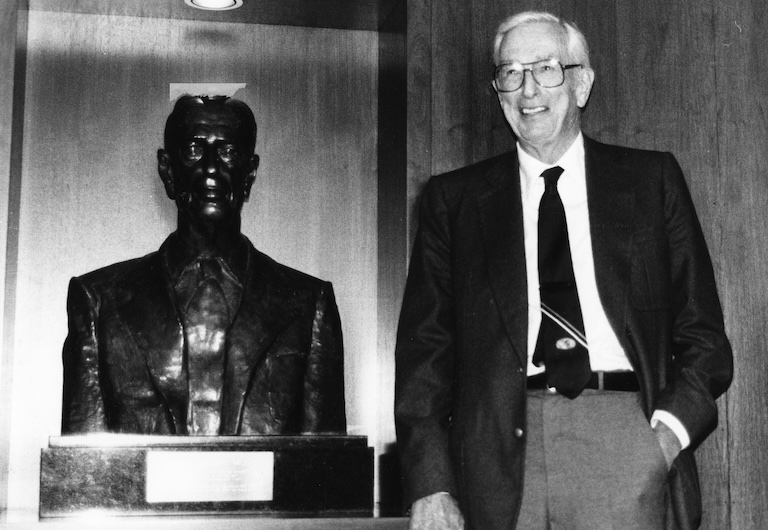
1958
Honor Code
Honor Code adopted by the students and approved by the faculty.
1958
West is next
Thanks to a gift by the Seeley W. Mudd Foundation, West Hall is completed.
1958
Saddle Rock start
First Saddle Rock board meeting held on Henry T. Mudd’s ranch near Malibu.
1959
Accredited
HMC receives accreditation from the Western College Association after Stuart Black and Peter Loeb transfer to the College and become its first senior class (an accreditation requirement).
1959
Another dorm
North Hall dormitory opens.
1959
Parent support
HMC forms first parents’ organization chaired by L.J. Barden of Guasti.
1959
Building progress
The Jacobs Science Center completed. Campus consists of three dormitories, a president’s house, a laboratory building, and swimming pool.
1959
The first graduates
Two students—Stuart Black and Peter Loeb—graduate during the first commencement. Ceremony is nationally televised.
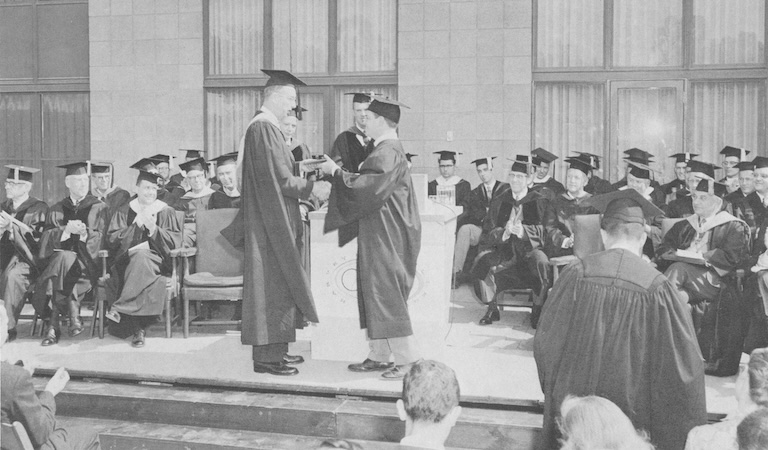
1960
First alumna
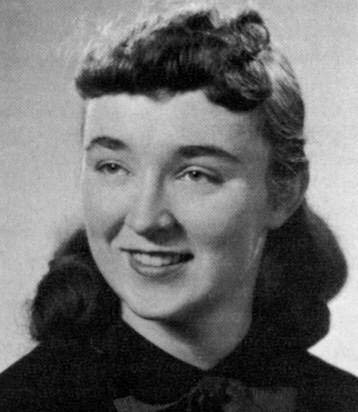
First alumna Janet Cook graduates.
1960
Official seal
College seal, designed by Thomas Jamieson, officially adopted.
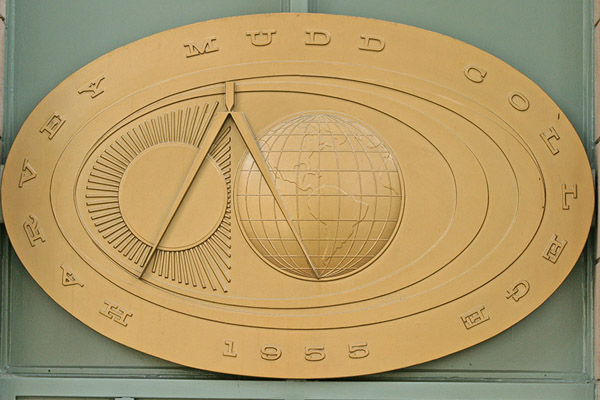
1961
Administration buildings
Thomas-Garrett and Kingston buildings completed with funding from Mrs. Frederick Kingston, Mr. and Mrs. Leroy Garrett, and the Harvey S. and Mildred E. Mudd Foundation.
1961
Consortium established
The Associated Colleges officially becomes The Claremont Colleges.
1961
Venus fountain
Henry Mudd acquires from Florence, Italy, a fountain in the form of Venus to be placed on campus.
1961
First four-year class
Founding Class of 1961, 32 members graduate.

1961
Annual holiday gathering
The first recorded non-Homecoming event on campus was a Christmas party, which occurred annually through 1981.
1962
Computing power
HMC buys its first computer, an IBM 1620.
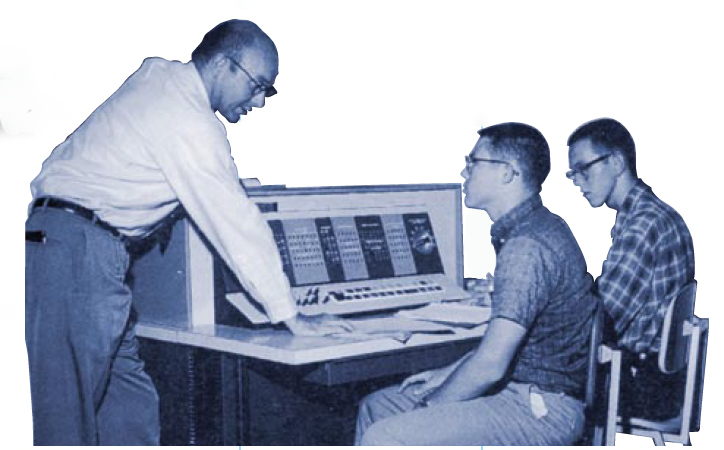
1962
International student
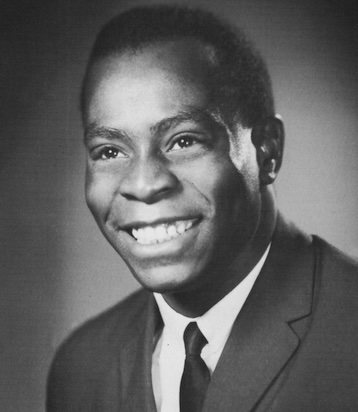
HMC admits its first international student, Paul Vitta.
1962
Class of 1962
Thirty-six students graduate, more than doubling the number of graduates, the only graduating class with this distinction.
1962
Bates Aero Program
Bates Foundation is established to support the Bates aeronautics program, led by Iris and Howard Critchell. Program runs until 1990.
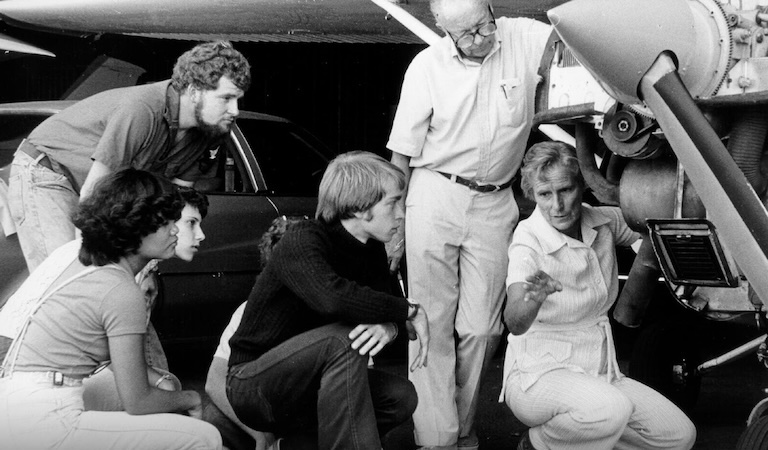
1962
Platt Campus Center
Joseph B. Platt Campus Center completed. Dedication postponed due to assassination of President Kennedy on Nov. 22.
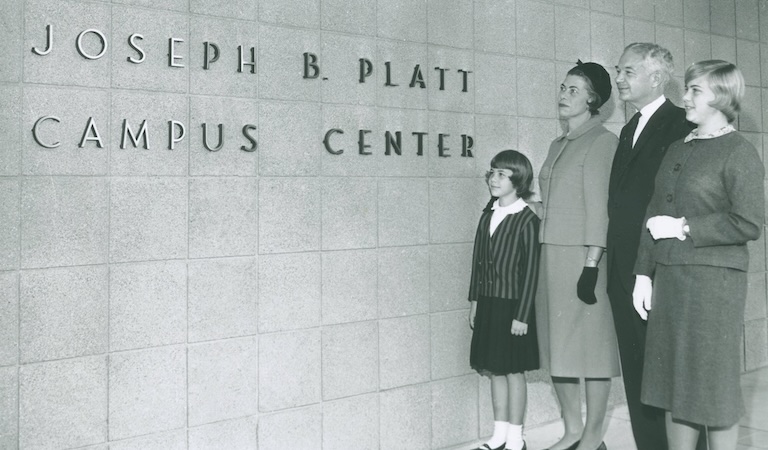
Clinic Program begins
Engineering Clinic Program created in 1963 by professors Jack Alford and Mack Gilkeson, with monetary assistance from the National Science Foundation and the Sloan Foundation. First Engineering Clinic project is sponsored in 1964 by United States Steel Foundation.
1965
Fundraising campaign
Impact/72 is launched to raise $18.75 million and increase the student body to 400 by 1972.
1965
Alumni Association
HMC Alumni Association officially formed.
1966
Bug prank

A Volkswagen owned by Gary Jahns ’66 appears in a hallway of East Dorm. Pranksters Jim Dewar, Charlie Brown, Terry Needham and Ernie Sullivan admit to tipping the car on end to get it there.
1966
Grading reprieve
Freshman year grading changes to pass/fail.
1966
Small school, big impact
HMC graduates more physics majors than USC and more chemistry majors than Stanford.
1968
South Dorm
South Hall/Marks Residence Hall built with support from David X. Marks.
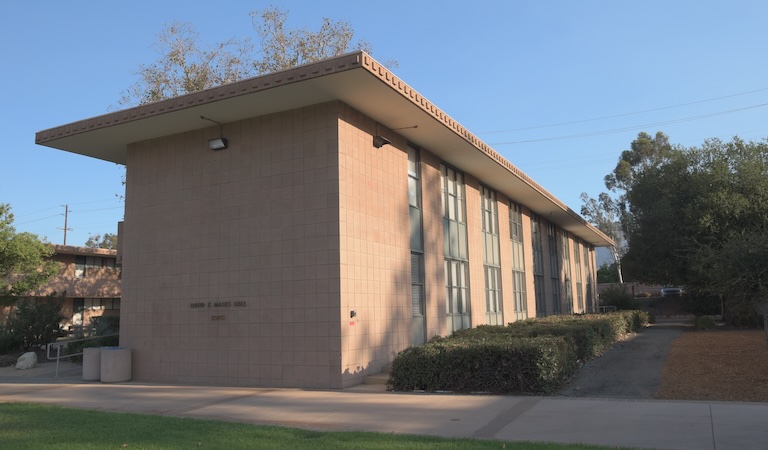
1966
First AABOG meeting
Original officers: Robert Hall ’62 (president), David Goodsell ’62 (VP), Janet Cook ’62 (secretary), Dennis Diestler ’64 (treasurer). Founding Class member Jerry Van Hecke ’61 was also a founding governor.
1969
Community values
Statement of student rights and responsibilities drafted and endorsed by faculty, ASHMC, and adopted by trustees.
1969
Master’s program
Five-year master of engineering program approved. Collaboration with Claremont Graduate School/University continues until 2003.
1970
Libra complex
Construction begins on Libra complex, which consists of a second laboratory building, the Sprague Library, refurbishing of the initial laboratory building and construction of lecture auditoria.
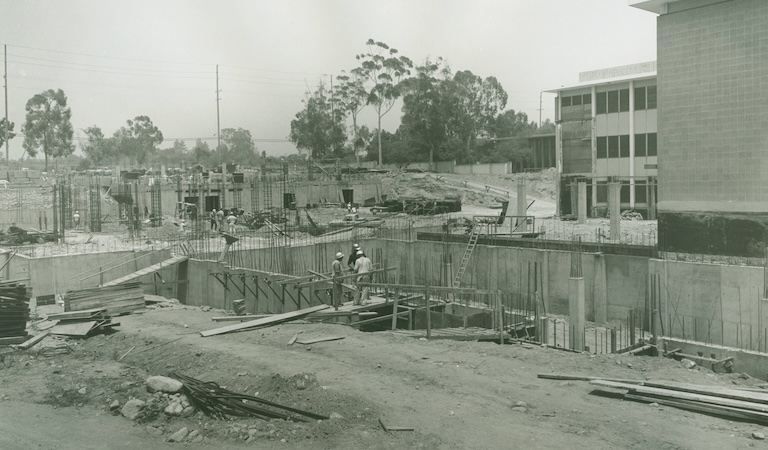
1970
Freshman Division
HMC faculty create the Freshman Division, a group of faculty with full responsibility for designing, teaching, altering and grading the academic work of all first-year students.
1970
Alum faculty member
Gerald Van Hecke ’61 joins faculty and later becomes first HMC alumnus to earn tenure at Mudd.
1970
First woman faculty member, tenure track
First woman appointed to tenure track position: J’nan Morse Sellery, assistant professor in humanities and social sciences.
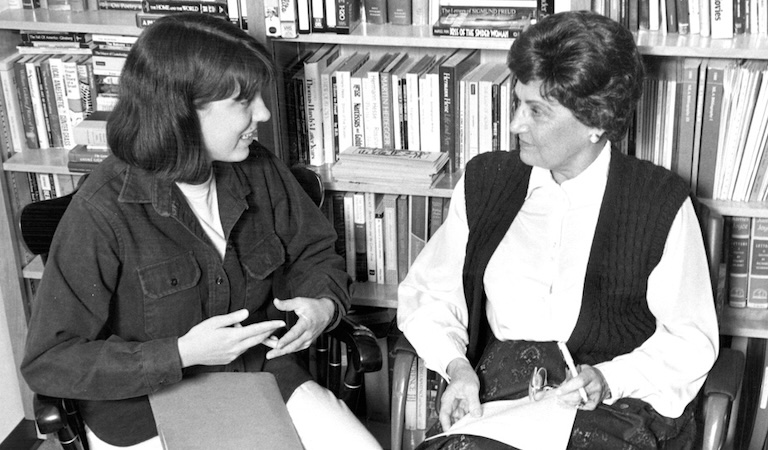
1971
Parsons building
Ralph M. Parsons Engineering building completed. Mr. Parsons receives HMC’s first honorary doctorate in engineering.
1972
Construction zone
Galileo Hall, Hixon Court and W.M. Keck Laboratories completed.
1972
Unicycles
Unicycle craze begins on campus with Class of 1972 members Karl Rudnick, Richard Jones, Ted Cox, Floyd Spencer and David Van Vactor.
1972
First alum board member
Malcolm Lewis ’67 becomes first alumnus to join HMC Board of Trustees.
1973
Beginnings of CS
HMC faculty vote to establish computer science group.
1973
First Math Clinic
First Mathematics Clinic involves client Bell and Howell and microfilm readers.
1973
Student research journal
“Interface,” first interdisciplinary journal of HMC student research published.
1974
Enrollment grows
Enrollment is largest in history of College (463 students), with applications up 8.5 percent over 1973, the first increase since 1970. Housing shortage persists until the early ’80s.
1975
Sprague leads with microfiche
HMC’s Sprague Memorial Library is one of first libraries in the country to put its card catalog on microfiche, increasing efficiency and saving money.
1976
Campaign 25/32
Launched in 1976, the campaign, A Second Generation of Commitment, runs for four years and raises $25 million for the College. It funds endowment, operating funds, building debt, curriculum development/faculty research, and equipment and biological sciences laboratories.
1976
Platt resigns; Baker appointed
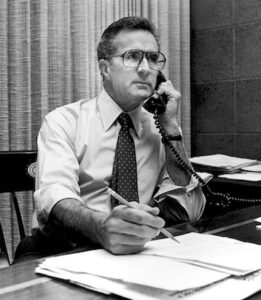
Founding President Joseph B. Platt resigns after 20 years in leadership; 958 students have graduated during his tenure. D. Kenneth Baker named to succeed him.
1976
Upward Bound
Upward Bound program, led by Octavio Bubion, moves to the HMC campus.
1976
Women’s athletics
Scripps, CMC and HMC develop joint program for women’s athletics to include swimming, volleyball and tennis.
1977
Origin of biology
Instruction in biology begins on campus with appointment of William L. Purves.
1977
Campus extended
Busy Mills Ave. closed to through traffic. East end of HMC campus takes shape.
1978
MESA
Under the leadership of Professor Tom Woodson, HMC starts the Mathematics, Engineering, Science Achievement (MESA) program. It continues until the early 2000s.
1978
High selectivity ranking
In a 1978 UCLA research group study about selectivity, HMC is ranked eighth in nation, ahead of Princeton and Stanford.
1979
Computing innovation
In cooperation with CMC, Pitzer and Scripps, HMC buys VAX 11-780 computer, installed on HMC campus. It is first VAX computer sold to an undergraduate college and only the second to be installed in Southern California.
1979
Land expansion
HMC acquires 20 acres of land east of Mills Ave.
1979
Alumni Day
The first Alumni Day (now Alumni Weekend) brings 100 attendees to campus and includes a paper airplane contest.
1979
Wright Prize
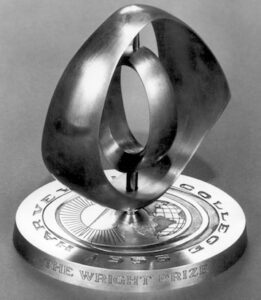
Inauguration of The Wright Prize, enabled by H. Dudley Wright, industrialist, entrepreneur and College trustee, as an expression of his support for interdisciplinary study. Brings distinguished scientists and engineers of the day to campus. First recipient is Edwin H. Land, physicist. Last recipient in 2001 is biomathematician Nancy Kopell.
1980
Muddraker
Student newspaper, The Muddraker, established. First editor is Ian McCutcheon ’83.
1980
Mall dedication
Liquidambar Mall dedicated in honor of Trustee Ted Braun, longtime PR counsel.
1980
National award firsts
A.J. Shaka ’80 is HMC’s first Rhodes Scholarship recipient, and Alec Norton ’80 is College’s first Marshall Scholarship recipient.
1981
Atwood Dorm
John Leland (Lee) Atwood Residence Hall (New Dorm) completed, relieving housing shortage.
1981
First CS faculty member
Hiring of first computer science faculty member, Michael Erlinger.
1981
HMC Bulletin
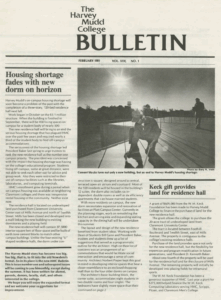
First issue of the College’s periodical is produced bimonthly for College constituents. The Bulletin eventually becomes the Harvey Mudd College Magazine in the 1990s.
1981
Military grad
Michelle Darling ’81/82 commissioned as second lieutenant, U.S. Army. She is first female HMC student to be cited as a distinguished military graduate.
1981
Campus art
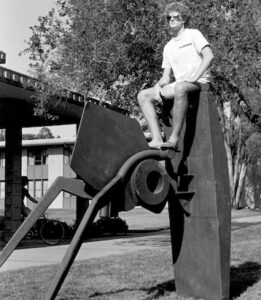
“Motion Shield” artwork donated by Dr. and Mrs. Ronald Linde. First sculpture, after Venus in Hixon Court, to be placed on campus.
1981
CS graphics lab
Grant from Jones Foundation enables computer graphics laboratory, the first undergraduate laboratory of its type on West Coast.
1982
Admission office moves to HMC
Emery Walker retires and the joint admission department agreement between HMC and CMC ends. New Director Duncan Murdoch sets up HMC’s first Office of Admission in renovated Kingston Hall and introduces the “Junk Mail” recruitment mailer, which proves to be a popular and effective marketing tactic.
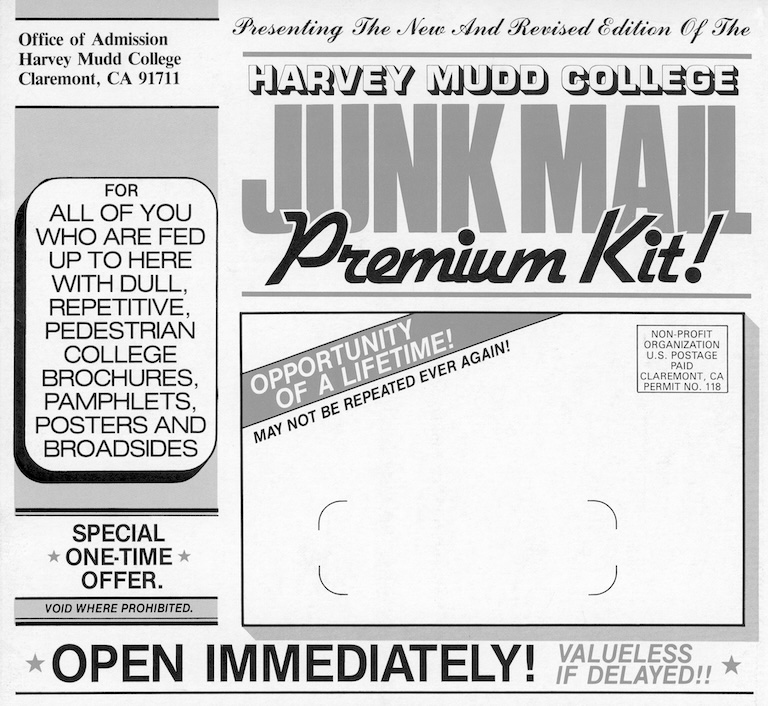
1982
First alum department chair
Richard G. Olson ’62 is first HMC graduate to become a department chair (Department of Humanities and Social Sciences).
1983
Name change for East
East Hall renamed Mildred E. Mudd Hall.
1983
First Honorary Alum
Jean Platt, the College’s first first spouse, is named the recipient of the newly created Honorary Alumni Award for contributing significantly to the betterment of HMC students and alumni.
1984
CS Department
Department of Computer Science created.
1984
ROTC
Air Force ROTC classes first offered on campus.
1985
Case Hall
Florence H. and Gerald R. Case Residence Hall completed.
1985
Let the games begin
Playing field added to east end of campus.
1986
Epic prank
Caltech cannon stolen, displayed on HMC campus, then returned.
1985
Core updates
Major changes made to curriculum to allow more flexibility for students in the Common Core.
1986
2000th graduate
Vivek Hiremath ’86 is College’s 2,000th graduate.
1986
First legacy grad
James S. Barrera III ’86 is first second-generation Mudd graduate (his dad is Joseph S. Barrera II ’62).
1986
VAX computer rooms
New machine rooms in the basements of Parsons, Jacobs, Libra Complex, Kingston Hall accommodate VAX computers.
1987
First wired campus
Installation of an Ethernet network throughout the Libra complex completed. Followed by the installation of a fiber optic cable from the computer center to Kingston Hall, the Campus Center and all 6 residence halls, thus producing the campus “backbone.” HMC is first college in California to be completely wired.
1987
Mudd or bust
Bust of Henry Mudd cast in bronze is sculpted by Lewis Cohen.
1987
Campbell retires
J. Arthur Campbell, HMC’s first faculty member, retires.
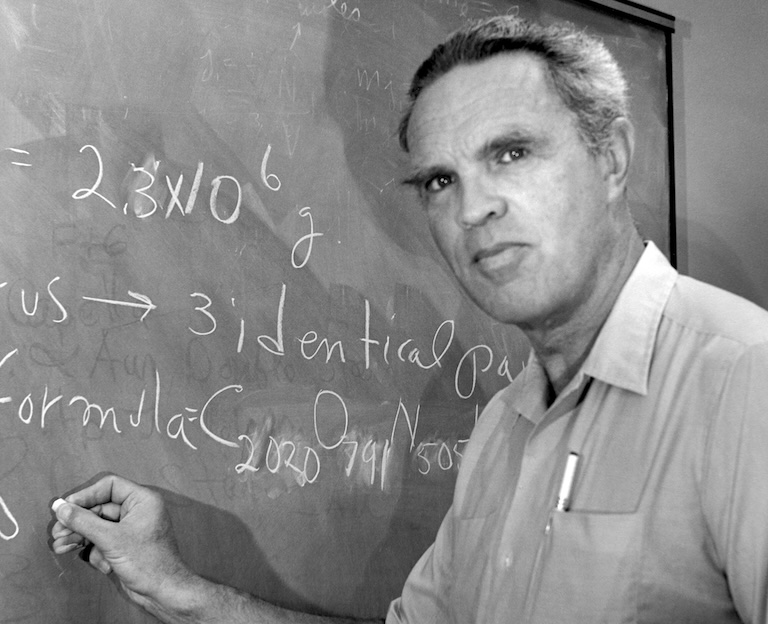
1988
President Riggs
Henry E. Riggs becomes third HMC president.
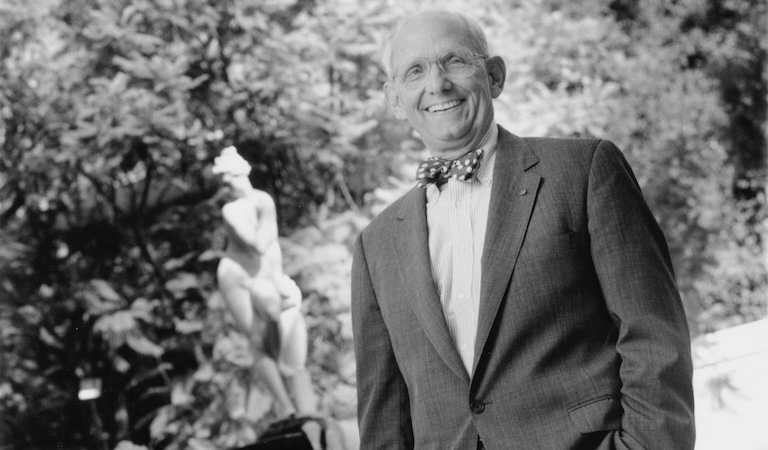
1988
Land purchase
HMC acquires right to purchase five acres of land west of Sprague Library making possible further expansions of the physical plant.
1989
Biology major
Biology major is official. Bio 52 is a technical core requirement for all Mudders.
1989
Tenure first
Kerry Karukstis is first tenured woman faculty member in a technical field.
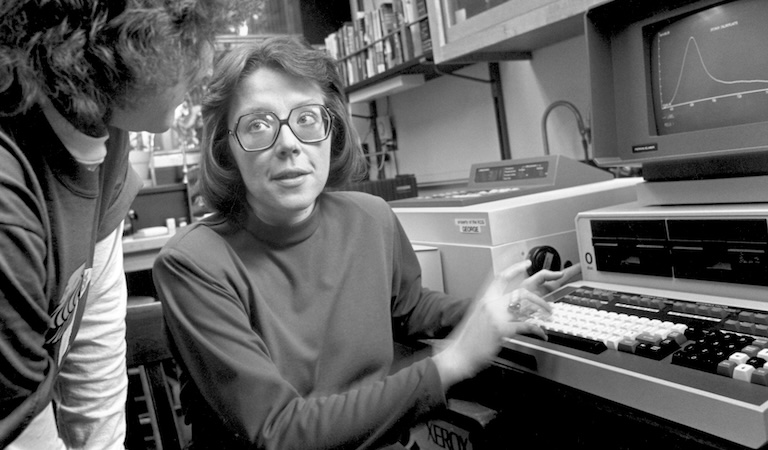
1990
Computer network
Computer network completed and dedicated. HMC is first undergraduate college in California to be completely wired.
1990
George McKelvey retires
George McKelvey, vice president for development, retires after having served for a longer continuous period than any other member of the faculty or staff.
1990
Henry T. Mudd dies
Generous benefactor Henry T. Mudd, son of Harvey S. and Mildred E. Mudd, dies. His contributions boost college assets beyond $100 million.
1990
Summer Institute precursor
Bridge Program inagurated (later named Summer Institute). It eases transition from high school to HMC for selected students.
1991
Parsons addition
Parsons Wing added to Parsons Engineering Building.
1992
Presentation Days
Inauguration of Presentation Days program, during which students present the results of capstone projects.
1992
CS major
Computer science major approved.
1992
Henry T. Mudd Prize
Henry T. Mudd Prize, funded by family and friends of Henry Mudd, awarded to faculty or staff who have provided outstanding service to HMC. First recipient is Founding President Emeritus Joseph B. Platt.
1993
Olin Science Center
The F.W. Olin Science Center built with funds from the F.W. Olin Foundation.
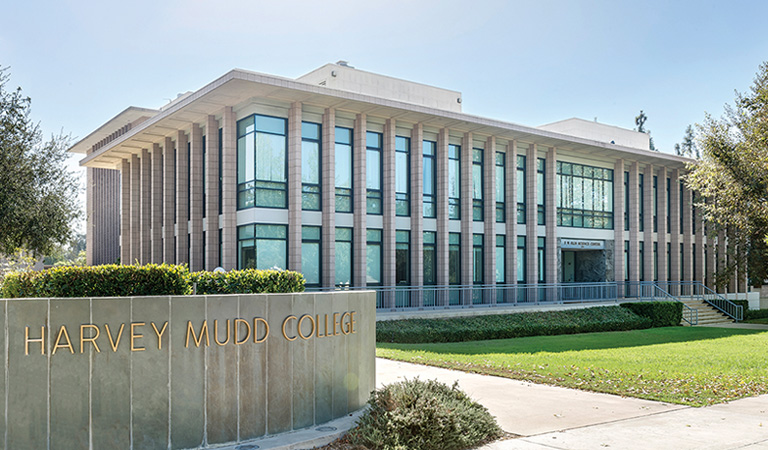
1993
Biology major
Biology major inaugurated.
1993
CS Clinic
Computer Science Clinic Program begins.
1993
Beckman
Beckman Hall built using funds from the Arnold and Mabel Beckman Foundation.
1994
One of a Kind Campaign
The Campaign for Harvey Mudd College exceeds campaign goal of $70 million with $75.5 million raised.
1995
Off-campus major
Off-campus major approved.
1996
Physics Clinic
First Physics Clinic offered.
1996
Sofahenge
Anonymous pranksters create “Sofahenge” on the Liquidambar Mall.
1997
President Jon Strauss
Jon C. Strauss becomes fourth HMC president.
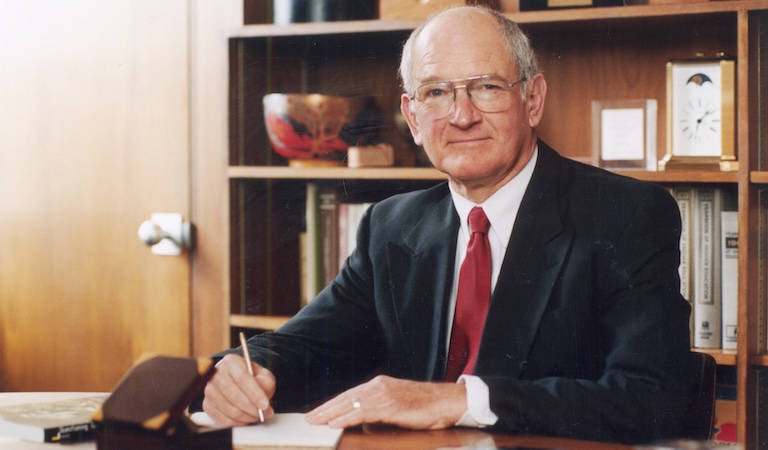
1997
ICM win
HMC is the first undergraduate institution to win the International Association of Computing Machinery Programming Contest.
1997
Lofty tradition
First Mt. Baldy alumni hike, a tradition that continues each September.
1997
CS and math major
First joint major established: computer science and mathematics.
1997
Binder Prize
Ann Villa, building attendant, receives first Mary G. Binder Prize, established by a gift from Professor Sam Tanenbaum and Carol Tanenbaum, his wife, to honor Carol’s mother, Mary G. Binder. It is given annually to outstanding support staff members.
Apker Award
The Department of Physics and Gwen Bell Porter ’98 win College’s first LeRoy Apker Award from the American Physical Society.
1998
Center for Design Education
Grant from General Electrical Fund enables Center for Design Education, headed by Clive Dym, Fletcher Jones Professor
of Engineering Design.
1999
MCM win
HMC teams win three Outstanding Awards at the Mathematical Competition in Modeling. At the time, no other school had done this.
2000
Rhodes Scholar No. 2
Elisha Peterson ’00, mathematics major, becomes HMC’s second Rhodes Scholar recipient, and one of youngest recipients ever at 19.
2000
Alumni gift
HMC receives first alumni gift in excess of $1 million from Csilla and Walt Foley ’69. Walt is the first alumnus to endow a professorship.
2000
Center for Environmental Studies
HMC establishes Center for Environmental Studies (predecessor of the Hixon Center for Climate and the Environment), and the Center sponsors a Clinic project.
2000
Putnam leaders
In Putnam Mathematical Competition, HMC outperforms nearly all other schools in participation and numbers of Top-100 finishers. Seven Mudders place in Top 100. HMC has highest participation (84) in nation.
2000
Liberal arts classification
HMC’s Carnegie Classification changes from Specialized School of Engineering and Technology to Baccalaureate College-Liberal Arts. HMC is ranked the 14th “best” Liberal Arts College in the nation.
2000
Outstanding Alumni Award
Renowned opthalmologist Susan Lewallen ’76 receives the HMC Alumni Association’s first Outstanding Alumni Award.
2001
Life Sciences Center
Keck Foundation award initiates Center for Quantitative Life Sciences.
2001
Entrepreneurial Network
Gary Evans, professor of economics (1981–2020), founds the HMC Entrepreneurial Network to connect those interested in entrepreneurship. Its first meetings are held in Berkeley, Santa Clara, La Jolla and San Francisco.
2001
Institutional Diversity
HMC establishes Office of Institutional Diversity.
2001
Math-bio major
Mathematical biology major added to curriculum.
2002
Solar power
College’s first solar array added to Case Residence Hall rooftop.
2002
Joe Jacobs honored
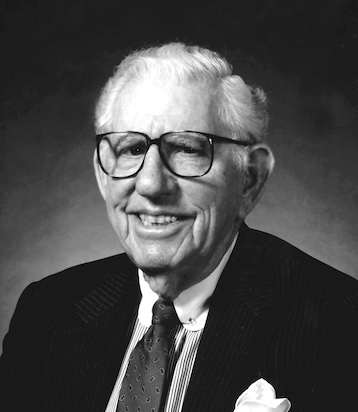
Longtime trustee Joseph J. Jacobs (1916–2004) named Entrepreneur of the Year at first conference of the Entrepreneurial Network, which Jacobs helped fund.
2003
Most wired campus
KABC-TV Channel 7 in Los Angeles reports that HMC is among “most wired” campuses in the country.
2003
Master of engineering concludes
Ryan Jackson ’02/03 and Brian Yoxall ’02/03 are last two graduates to complete the HMC/Claremont Graduate University master of engineering program, which is discontinued. A total of 219 graduates received M.E. degrees through the program.
2004
Sontag dorm
Frederick and Susan Sontag Residence Hall completed.
2004
Platt Blvd.
12th Street re-named Platt Blvd. in honor of Founding President and First Lady Joseph and Jean Platt.
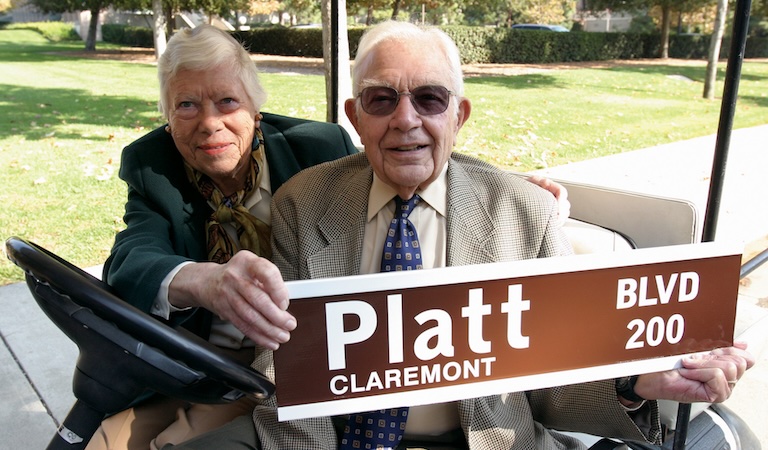
2004
Pool demolished
Horace Bell Pool and locker facilities demolished to make way for Hoch-Shanahan Dining Commons.
2004
Women professors
Number of full professors who are women double with promotion of Shenda Baker, chemistry, Lisette de Pillis, mathematics, and Patricia Sparks, physics.
2005
Math Department award
Inaugural award for an Exemplary Program or Achievement in a Mathematics Department is presented to HMC by American Mathematical Society.
2005
Computational collaboration
HMC joins World Community Grid to work on large computational projects via the Internet.
2005
Jay’s Place
Jay’s Place, HMC’s renovated late-night campus eatery (formerly The Little Pizza Place), established by the family of Jay Wolkin ’99.

2006
President Maria Klawe
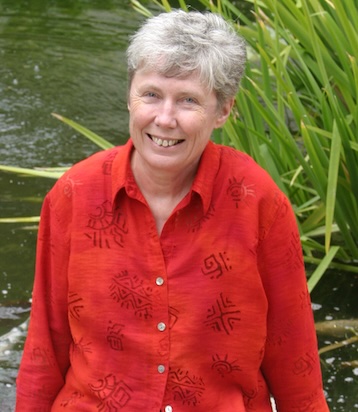
Maria M. Klawe named fifth HMC president.
2006
New dining hall
Hoch-Shanahan Dining Commons officially opens for diners.
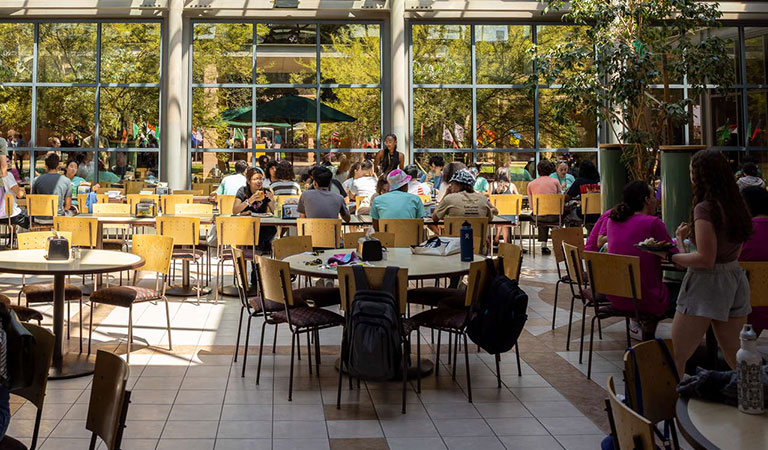
2006
Significant bequest
HMC receives largest bequest in its history ($15 million).
2006
Global Clinics
HMC begins Global Clinic Program to prepare students for the challenges of functioning as innovative engineers and scientists in a global context.
2006
Engineering design kudos
BusinessWeek lists HMC’s engineering design program as one of nation’s best.
2006
Strategic planning
During strategic planning sessions, HMC community strategizes size, structure, curriculum, student body makeup and impact upon society. Meeetings, roundtables, workshops and debates result in six themes.
2006
Clinic project in space
Clinic project for The Aerospace Corp., launched into space. Original design of camera circuitry boards on picosats were developed by 2003-2004 Clinic team.
2006
Lifetime Recognition Award
First awards for Lifetime Recognition presented by the HMC Alumni Association to Jean and Joe Platt, and longtime trustees Hubie Clark, Clifford Miller and Trude Taylor.
2007
First sustainability club
Students create Mudders Organizing for Sustainability Solutions and Engineers for a Sustainable World.
2007
Annenberg Speaker Series
Walter and Leonore Annenberg Fund for Leadership Development inaugurated and first speaker series held.
2007
ACT accepted
To reach a more diverse population, HMC begins accepting ACT test scores. Record numbers of applications received, 18% higher than previous year.
2007
Honorary doctorate awarded to first woman
Astronaut Mae Jemison is first woman and 11th recipient of HMC’s honorary doctorate of engineering degree.
2007
Platt improvements
Platt Campus Center upgraded. Additions include meeting space, music rooms, study areas.
2008
Study abroad milestone
Graduating class surpasses all previous classes with most students (38) who spent part of their undergrad years abroad.
2008
7C environmental fair
Students organize Earth to Claremont, the first consortium-wide environmental fair hosted by HMC’s Center for Environmental Studies.
2008
Climate Commitment
President Klawe signs American College and University Presidents Climate Commitment and appoints campus-wide Sustainabilty Committee made up of members from all campus stakeholder groups.
2008
Transformative gift
$25-million gift pledged by Shanahan family is largest donation in HMC’s 53-year history.
2008
Engineering Fellowship
Pledge of $500,000 by Malcolm ’67 and Cynthia Lewis establishes Patton and Claire Lewis Fellowship in Engineering Professional Practice.
2008
Technology upgrade
Fletcher Jones Foundation’s $750,000 gift enables educational technology infrastructure upgrade.
2009
Klawe appointments
President Klawe elected to American Academy of Arts and Sciences and named to Microsoft board of directors, becoming 10th member and second woman.
2009
Churchill Scholars
For the first time, HMC has two Churchill Scholarship recipients in the same year.
2009
Astronaut Hall of Famer
Pinky Nelson ’72 inducted into U.S. Astronaut Hall of Fame.
2009
Land purchase
HMC purchases 11.46 acres, expanding campus and preparing for future opportunities.
2009
Core award
Mellon Foundation supports Core Curriculum revision with $419,000 grant.
2009
Math funding
$1 million gift establishes Kenneth A. and Diana G. Jonsson Professorship in Mathematics and the Jonsson Endowed Fund for mathematics department travel.
2010
Computing contest win
HMC team wins Southern California regionals and earns honorable mention at world finals of International Collegiate Programming Contest.
2010
Homework Hotline
HMC Homework Hotline created in cooperation with Rose-Hulman Institute of Technology. The program ends in 2024.
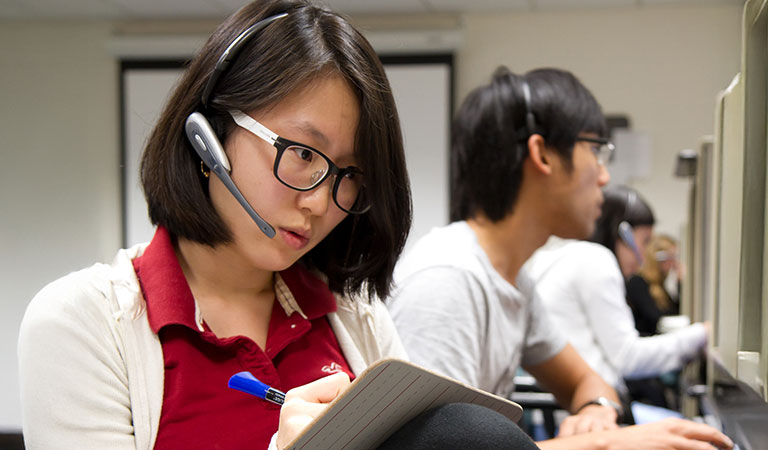
2010
Engineering creativity
Students create a Rube Goldberg machine that spans the residential area.
2010
Global Clinic gift
Global Clinic supported with $1 million gift from Vickery family.
2010
Clinic project takes deep dive
The Ocean Research and Conservation Association launches portable deep-sea webcam, a 2001 Clinic project.
2010
Mentor program
New student mentor program provides additional advising for first-year students.
2010
Core Curriculum update
HMC launches new Core Curriculum that provides rigorous broad-based knowledge and experience, creates flexibility to pursue intellectual passions, new interdisciplinary electives or foreign language.
2010
Women make up majority
Class of 2014 women (52%) outnumber men for first time in College’s history.
2011
Founding Class milestone
College’s first 50-year reunion celebrated by the Founding Class of 1961.
2012
Taylor Swift on campus
Travis Beckman ’14 and Yeahmoon Hong ’14 rally students across The Claremont Colleges to help Harvey Mudd College win an online contest that brings country artist Taylor Swift to Claremont for an intimate concert.
2012
Backgammon champs
HMC team wins first place, 2012 National Backgammon Collegiate Team Championships.
2012
Solar eclipse trip to Australia
Harvey Mudd community members travel together to view the Nov. 14, 2012 solar eclipse in Australia. Physics Professor Greg Lyzenga ’75 led the 10-day adventure that included snorkeling in the Great Barrier Reef and exploring aboriginal culture.
2012
Gordon Prize
HMC Engineering faculty win prestigious Bernard M. Gordon Prize for Innovation in Engineering and Technology Education.
2013
Slow growth
Board of trustees votes to slowly grow the size of the College by 100 students over the next 10 years and approves 10 faculty positions to maintain student:faculty ratio.
2013
Shanahan Center completed
The LEED Gold-certified R. Michael Shanahan Center for Teaching and Learning is completed in time for fall 2013.
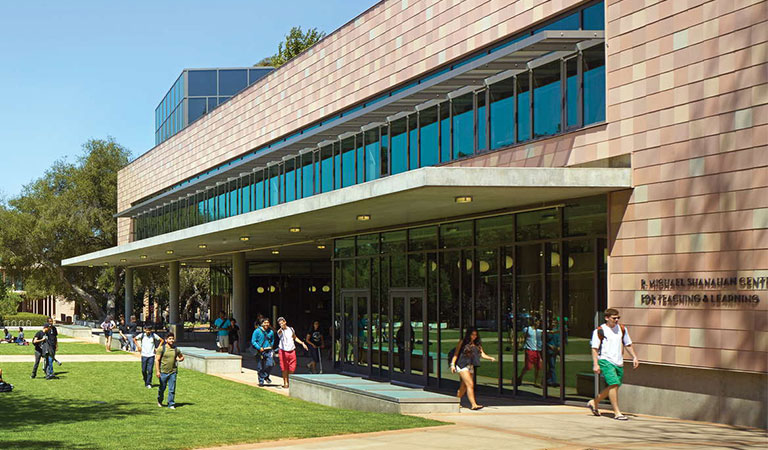
2013
Clinic 50th
The Clinic Program commemorates a half-century, its gold anniversary marked by recognition from the National Academy of Engineering, which names the Engineering Clinic one of 29 “exemplary engineering programs.”
2013
New engineering faculty chair
Harvey Mudd trustee John Benediktsson ’01 and his wife, Rajashree Karwa, both engineers, establish the Benediktsson-Karwa Endowed Faculty Chair.
2013
Huppe Internship
Maggie Lewis and Bob Huppe, parents of Ben Huppe ’14, establish the Huppe Memorial Internship to honor Ben’s memory and his passion for science and social justice.
2014
New concert series
Department of Humanities, Social Sciences and the Arts inaugurates concert series performed in Drinkward Recital Hall. It is renamed the Ken Stevens ’61 Founding Class Concert Series in 2017.
2014
Women engineers
Class of 2014: more engineering degrees conferred to women than to men, 56%.
2014
Endowed faculty chairs
New endowed faculty chairs: Wilson Chair in Arts and the Humanities; Johnson-Rae Chair; Malcolm Lewis Chair.
2014
Parsons Building renovations
Parsons renovations, new Clinic areas and updated spaces for engineering and HSA.
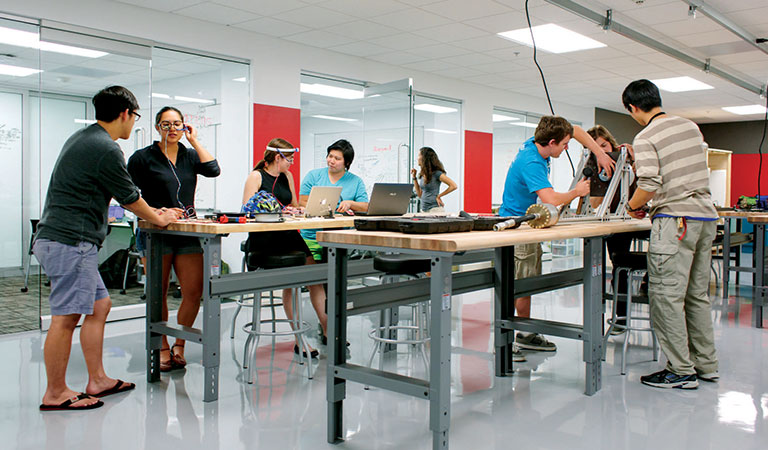
2015
Exemplary program
American Association of University Women calls HMC program exemplary in attracting women to computing.
2015
Hixon Center
Hixon Center for Sustainable Environmental Design established.
2016
Galileo Hall update
Galileo Auditoria modernized.
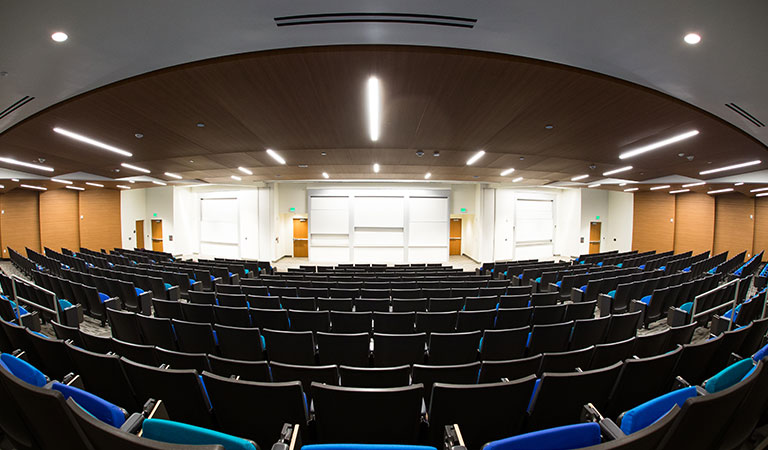
2016
Math and physics major
New joint major in math and physics approved.
2017
ICM win
HMC All-female team is an Outstanding winner (top 1 percent) in Interdisciplinary Contest in Modeling.
2017
Upward Bound funded
Upward Bound receives five-year $670,000 Department of Education grant renewal.
2017
Teaching and Learning Center
New 5C Center for Teaching and Learning opens. Inaugural director is Darryl Yong ’96.
2017
Math and physics major
Joint major in math and physics approved.
2018
Drinkward dorm earns LEED
Wayne and Julie Drinkward Residence Hall is fourth building to earn LEED certification.
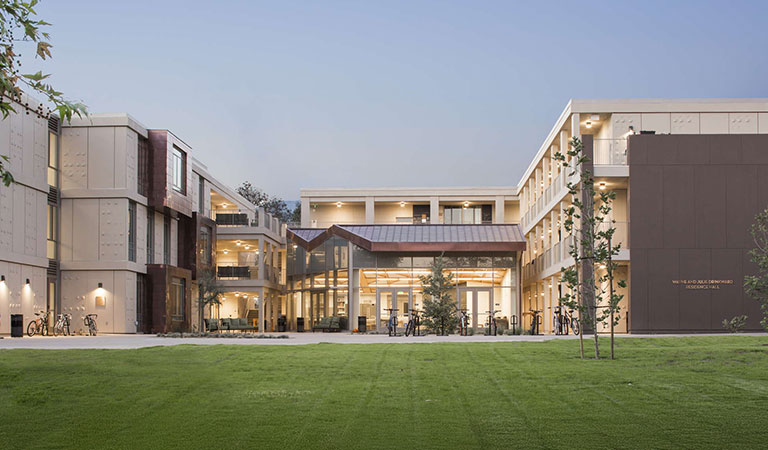
2019
Clinic solar panel project
A Clinic team designed a nonprofit solar panel factory—the first of its kind.
2019
STARS Silver rating
College receives a STARS Silver rating from the Association for the Advancement of Sustainability in Higher Education.
2020
Fulbright first
Harvey Mudd College is a top producer of U.S. Fulbright scholars (faculty, researchers and administrators) for 2019–2020 among bachelor’s institutions.
2020
Faculty development
Harvey Mudd College becomes a member of the National Center for Faculty Development & Diversity to support faculty and their professional development.
2020
Study abroad milestone
Forty-three Harvey Mudd College students study abroad during spring semester, the largest group in the College’s history.
2020
Project Connect
Office of Wellbeing creates Project Connect to help Harvey Mudd College students build new friendships across campus.
2021
Klawe steps down
After 15 years serving as president, Maria Klawe steps down. Her legacy includes significant growth in the College’s endowment, which helped advance Mudd’s facilities and financial aid. She also led during the construction of the R. Michael Shanahan Center for Teaching and Learning as well as new residential and academic buildings.
2020
Virtual career fair
Office of Career Services holds first virtual graduate school fair and partners again with Caltech to offer virtual career fairs.
2021
#StaySafeAtMudd
For fall 2021 during the pandemic, College establishes #StaySafeAtMudd guidelines, a safe, collaborative on-campus and virtual experience for students. More than 90% of faculty and staff and 99.4% of students are fully vaccinated by late summer.
2021
Sustainability projects
New sustainability projects: Two donor-funded ChargePoint dual-port charging stations, giving College six electric vehicle charging locations and solar carport and three arrays.
2021
McGregor Center
Scott A. McGregor Computer Science Center completed in spring 2021. Makerspace opens following appointment of new director, manager and student stewards.
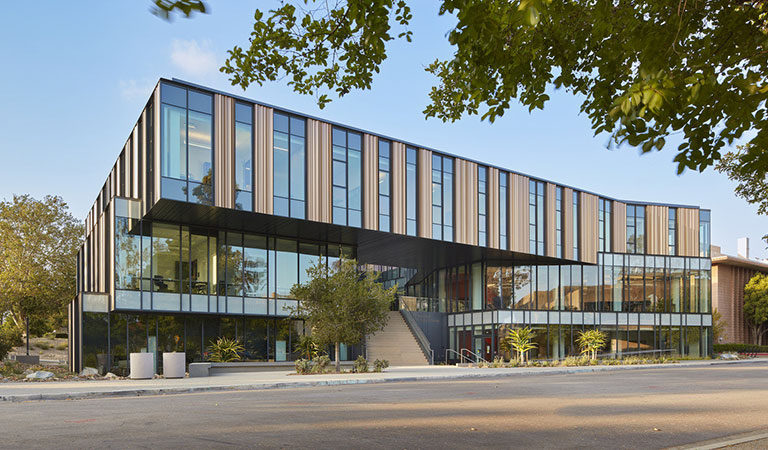
2021
Grad school fair
Office of Career Services holds first virtual graduate school fair and partners again with Caltech to offer virtual career fairs.
2021
First-gen Forward
College earns First-gen Forward Designation for institutions of higher education that improve experiences and advance outcomes of first-generation college students.
2021
Large applicant pool
Class of 2026 applicant pool is largest at this point in the College’s history.
2021
New name for Hixon Center
Hixon Center for Sustainable Environmental Design renamed the Hixon Center for Climate and the Environment to serve as the locus for new climate studies courses and other curricular, co-curricular and research endeavors.
2022
Computer science program success
College’s successful effort to raise percentage of women majoring in computer science featured as a case study in Harvard Kennedy School Case Program, world’s largest case study repository for government and public policy educators.
2022
McGregor Center highlighted
Engineering News-Record California names Scott A. McGregor Computer Science Center Southern California’s Best Higher Education/Research Project.
2022
Rocketry Club
A record number of Mudd Advanced Rocketry Club members attend Rocketry Organization of California’s ROCstock 2021 and earn certifications.
2022
Recommitment to mission
After U.S. Supreme Court decision removes ability of schools to consider race and ethnicity in admission decisions, Harvey Mudd College re-commits to its mission of preparing students who understand the impact of their work on society and its rededication to working within the boundaries of the decision to maintain a diverse and thriving community of future leaders.
2023
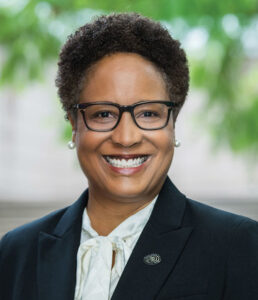
President Harriet B. Nembhard
President Harriet B. Nembhard becomes the sixth president of Harvey Mudd College. She launches Community Connections during her first 100 days, culminating in a 100 Days of Community Connections report (PDF).
2022
Democratic engagement
Office of Civic and Community Engagement celebrates College’s recognition for ALL IN Most Engaged Campus for College Student Voting, promoting democratic engagement among students.
2022
CS in K–12 curriculum
Harvey Mudd joins Code.org and over 500 U.S. industry, nonprofit and education leaders to issue a letter calling on state governments and education leaders to “update the K–12 curriculum in each state for every student in every school to have the opportunity to learn computer science.”
2022
CS and physics major
New joint major in computer science and physics approved.
2023
Supporting low-income families
Harvey Mudd joins other members of the Association of Independent California Colleges and Universities to launch The California Private College is Possible Initiative to advise California’s low-income families and first-generation prospective students.”
2023
STEMM Opportunity Alliance
Harvey Mudd College becomes a member of the STEMM Opportunity Alliance, an initiative to make equity in science fields a national priority and transform the American science, technology, engineering, mathematics and medicine ecosystem.
2023
Boissevain Chemistry Lectureship
Department of Chemistry receives a 2023 Jean Dreyfus Boissevain Lectureship for Undergraduate Institutions by the Camille and Henry Dreyfus Foundation. The award provides a grant for a leading researcher to give lectures in the chemical sciences support for chemistry summer research.
2023
Datathon champs
Harvey Mudd teams place first and second in Datathon Global Championship.
2023
Widening college access
Harvey Mudd College joins the Thrive Scholars College Collaborative, a network of college partners committed to fostering success for diverse and talented students.
2024
Chemistry and climate major
Faculty approves major in chemistry and climate, the first joint major with a climate focus.
2024
Civic education
Harvey Mudd joins College Presidents for Civic Preparedness, a new initiative aimed at advancing civic education. (2024)
ABS advancement
Student researchers, mentored by engineering professor Albert Dato identify a way to strengthen acrylonitrile butadiene styrene—a plastic widely used in the automotive, aerospace and electronic device industries—without adding a significant amount of weight to it.
2024
Top ICM team
Harvey Mudd team earns the designation of Outstanding in the 26th annual Interdisciplinary Contest in Modeling, placing in the Top 18 out of 10,000 teams participating in the ICM.
2024
Demining technology
Harvey Mudd students develop demining technology to help Ukraine.
Interdisciplinary engineering curriculum
The College receives $349,410 grant from the National Science Foundation to help engineering faculty, students and interdisciplinary climate experts enhance how student engineers evaluate the environmental, social and ethical impacts of their professional practice. (2024)
Apker Award
Eritas Yang ’24, a PhD student in astrophysics at Princeton University, receives the American Physical Society’s 2024 LeRoy Apker Award for outstanding achievements in physics, the highest honor for undergraduate physicists in the United States.
2024
Expanding research capabilities
Harvey Mudd and Claremont McKenna College receive a $918,485 grant from the National Science Foundation to acquire a high-performance computing cluster that expands The Claremont Colleges’ research capabilities across multiple disciplines.
2024
CS and climate major
Joint major in computer science and climate approved.
2024
Musizi and Mudd
Through the Clinic Program, Harvey Mudd partners with Musizi University, Uganda’s first liberal arts university, to design and implement a computing-integrated curriculum for Ugandan students.
2024
Thrive Scholars network
Harvey Mudd joins the Thrive Scholars College Collaborative, a network of college partners committed to fostering success for diverse and talented students.
2025
STEM for a Better World
The final draft of the strategic plan, STEM for a Better World, was approved by the board of trustees on Jan. 25.
2025
Celebrating Iris Critchell
Harvey Mudd community mourns passing of Instructor Emerita Iris Critchell (1920–2025).

2025
Piano donation
Harvey Mudd donates its Bösendorfer grand piano to a local music instructor from Altadena who lost her home and belongings in the Eaton Fire.
2025
New Carnegie Classification
Harvey Mudd receives new Carnegie Classification for “Research Colleges and Universities,” reinforcing its distinctive research program that provides opportunities for its students to engage in meaningful, leading-edge discovery.
2025
Innovation Showcase
On April 4, the College held its first Innovation Showcase where six Innovation Accelerator projects were presented for consideration to advance to the seed stage of funding. Three projects advance to the Innovation Accelerator Laboratory: Data Science and Social Impact; Emerging Health Technology; and Thriving in the Core Curriculum.
